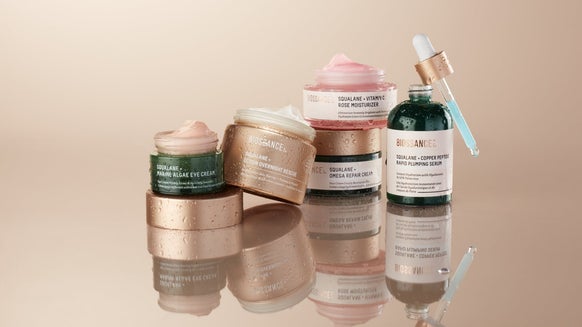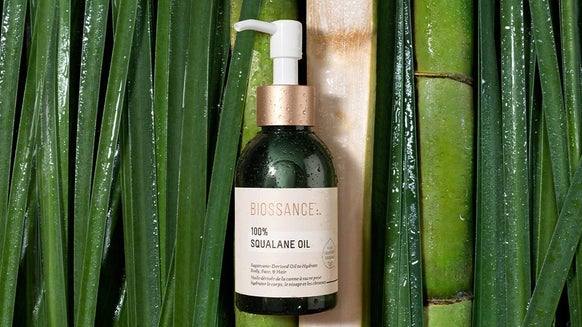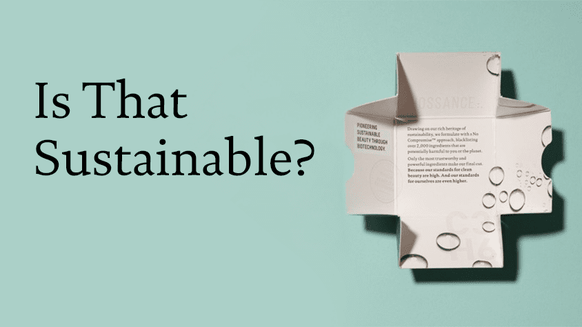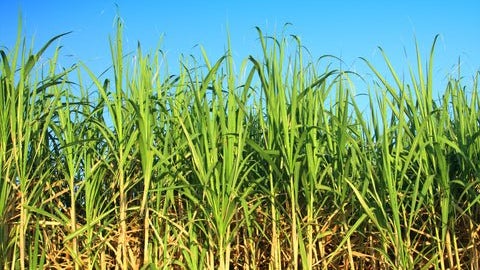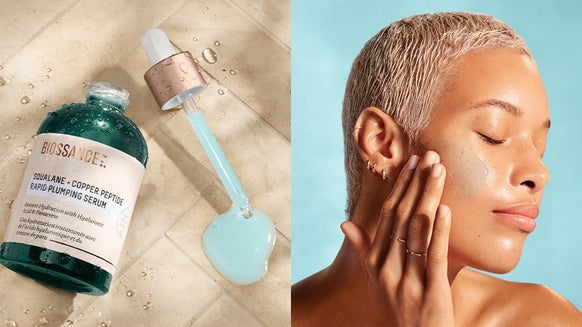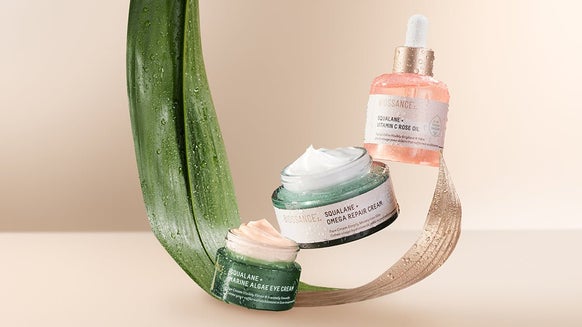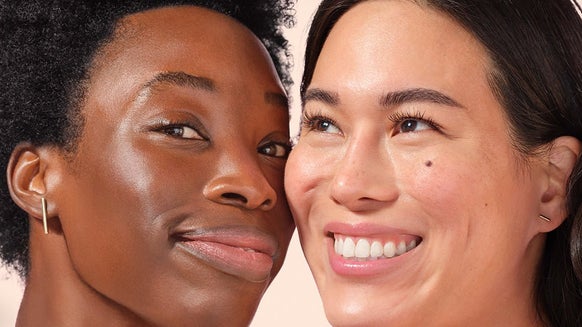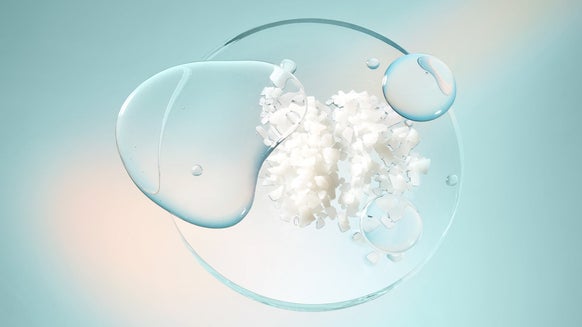Women in Clean Beauty
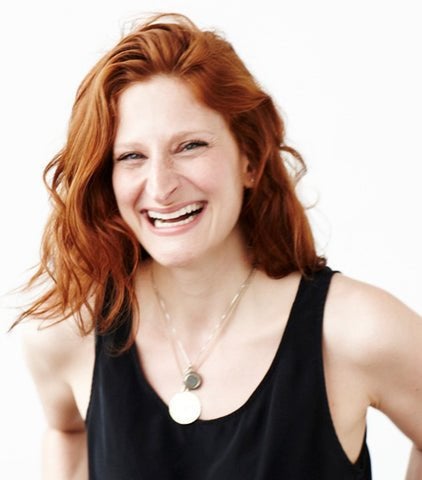
What if I told you that the US bans only 30 beauty ingredients (compared to around 1,400 ingredients in Europe and 2,000+ in all of our products)? Better believe it. But things are quickly changing thanks to these innovative women in clean beauty who are driven to change the status quo. They are fearlessly leading the way to cleaner, non-toxic beauty products for everyone. See what inspires me and these amazing women, learn great tips for shopping cleaner, and much more.
Katey Denno, Hollywood’s Long-Time Go-To Green Makeup Artist
How did you become interested in clean beauty?
It was a culmination of a number of things - a friend’s diagnosis with cancer, and the feeling of ‘what can I do?’, having been raised to be a label reader, having a real interest in health, and wellness. I’ll never forget the day I read the back of an oil-based, highly pigmented makeup palette that most makeup artists use. Each color had a corresponding sticker on the back, alerting the user as to which shade was for use where. I found it highly concerning that each color had specific restrictions for use: pink wasn’t to be used around lips or eyes, green was to be kept away from mucous membranes, and white wasn’t suitable for use around the mouth. (I’m exaggerating the notes, but, still… how could this be, and why?). I’d seen all colors used on all areas of the face, and it left me confused, and wanting answers. Once I started digging, I realized that the cosmetics industry in the US was without true regulation. It felt like I’d uncovered something that would blow the socks off of everyone I told… but it didn’t. It’s been a long, slow, uphill roll, and we’ve only just begun to alert the public. Educating consumers is one of my greatest goals, and I feel so fortunate to witness the shift that’s currently happening.
What advice would you give to people seeking to make positive impact in the world of beauty?
Please, come, we welcome you! Leave no stone unturned as you do your research, reach out to those who inspire you and ask specific questions, explore what drives you, what sets you apart within the field, and how you can harness your unique talents and voice, and share them.
What advice would you give to consumers looking for cleaner products?
There are so many great resources to help you navigate your purchasing process these days! Remember that you hold the power, and although it sounds a bit grandiose, I believe it to be true: you vote for the world that you want with each and every dollar you spend. Look for companies who are transparent enough to include their full ingredient list on each product, and do an online search of the ingredients that aren’t familiar to you (this will likely be every single one, at first!). Look for companies who in addition to making a good product, are also involved in some sort of social good, and support them by becoming a loyal customer. Together we really can shape the beauty industry so that we, the individual shopper, don't have to do the policing. We can create an industry full of safe and highly effective products that do good for our bodies and our environments. It’s just a matter of spreading the word, and holding companies (and ourselves) accountable.
Carley Klekas, Sustainability and Marketing at Biossance (That's me!)
How did you career path lead you to where you are now?
I have always been really passionate about environmental issues and environmental health. I worked in the cosmetics industry for 4 years after college and it got me really interested in the complexities in the beauty industry. Years later after working in CSR (Corporate Social Responsibility) and Sustainability, I went to graduate school to get an MBA in Sustainability and solidified my passion for integrating sustainability into the cosmetics industry. Through my graduate work it became crystal clear that this is what I wanted to do for a living.
What makes you most passionate about the work you do?
Honestly, I am appalled at the lack of regulation and safety oversight in the cosmetics industry. Yes, many ingredients are safe but there are so many that are not. There is absolutely no legitimate reason to expose people to harmful chemical without their knowledge when there are alternatives, especially for the sake of vanity. Many consumers assume if it’s on the shelf, it’s safe, and that just isn’t true. Some environmental health concerns are harder to avoid, but personal care products are a choice you can make. Thankfully there are a growing number of safe products at all price ranges, making it more accessible to everyone.
How did you become interested in clean beauty?
I always have had a love for lotions and potions of all sorts, and I have also always been an environmentalist. The two things are slightly at odds with themselves. Once I read the book “No More Dirty Looks”, it kind of sealed the deal. Also, there is so much good work to be done in the industry and that is inspiring and keeps me motivated.
What advice would you give to people seeking to make positive impact in the world of beauty?
The beauty industry is complicated and has many challenges. Don’t be afraid to ask more questions and look for credible 3rd party verifications. Doing so does make a difference long term.
What words of inspiration would you share on how the industry is changing for the better?
There are many examples of how it’s changing for the better. One of the big things is that Fortune 100 personal care companies are making changes to eliminate certain ingredients and clean up their products. Also, major beauty retailers are starting to carry more and more non-toxic brands. It’s becoming easier to find cleaner products.
What's the number one culprit to look for that gives away a product is not clean?
I would say, PEG ingredients, parabens or fragrances that are not disclosed.
What was the most shocking thing you have learned about what's in products?
I think formaldehyde and formaldehyde releasers are pretty shocking, and there are a whole host of them.
What advice would you give to consumers looking for cleaner products?
Look at well trusted resources for information, ask lots of questions of the brands you like and educate yourself. Many brands are trying to help educate consumers and there are a host of non-profits helping out too, like EWG, and the Campaign for Safe Cosmetics.
Mia Davis, Former Head of Health and Safety at Beautycounter
What makes you most passionate about the work you do?
I’m most passionate about how many different solutions there are to removing toxic chemicals from our products. There are many more great safer solutions today then there was 10 years ago.
How did you become interested in clean beauty?
I started my career in the plastics space trying to help remove harmful chemicals like phthalates. I found that I really loved this space. Non-toxic products has a link to everything from plastics to food and water to skincare products. I think people have an “ah ha” moment when they realize they can also make changes in the products they use and discover why wouldn’t they be making a safer choice.
What advice would you give to people seeking to make positive impact in the world of beauty?
As far as the beauty industry as a whole goes, in our society we are still struggling with the image of beauty. The overarching image is still the same idealized version of women that is not reality; the golden standard of beauty.
In terms of products, I would say focus on the products you use most first or the products you use most frequently. If you put on body lotion 3 times a day, start there.
What words of inspiration would you share on how the industry is changing for the better?
Back in the day when I worked for the Campaign for Safe Cosmetics, there were only a few small brands focused on clean beauty. Now there are many larger brands that are making safer products. It’s much easier to find safe products these days.
What's the number one culprit to look for that gives away a product is not clean?
Fragrance – The term can cover up 1 to several different ingredients that could be potentially harmful like musk or phthalates. Just because it says fragrance doesn’t mean it is harmful, but you should be able to find out what that term includes. I believe companies should disclose fragrance ingredients on the packaging or at least on their website.
What was the most shocking thing you have learned about what's in products?
A number of years ago I picked up a well-known drug store brand that said “paraben-free, phthalate-free, etc.” on the front of the packaging and turned it around and there were parabens in the ingredient list. It was shocking and also demonstrated that clearly there were some miscommunication internally at their company, that due diligence was not done and was also a reminder of the industry being under regulated.
What advice would you give to consumers looking for cleaner products?
Look into the ethos of companies and brands you are interested in. Try to find out how they are evaluating ingredients. I don’t really believe there is a simple answer to this, such as looking for products with under 5 ingredients, I don’t believe that’s the best approach. Get to know the companies, how they treat their employees and ask them questions on what’s important to you.
Nneka Leiba, Director of Healthy Living Science Research at the Environmental Working Group
How did you become interested in clean beauty?
I got interested in this because of my work at EWG. Before working here, I always assumed that everything was safe and all the products on the shelf went through the highest standards. It’s more of everything we eat, are exposed to, etc. that we have to look at. After working at EWG 10 years ago I learned that the regulations were not strong. You couldn’t just pick something off the shelf and assume it was safe – you had to do so much homework. I saw the need for this information to be disseminated and that there were more people like me that thought incorrectly that everything was safe. Unfortunately that is not true. A lot of us different products for various reasons. But a lot of time, especially women use personal care products to make them feel better. A light scent or makeup to raise their spirits and it’s strange we made these products to make us feel better but unfortunately these ingredients could be potentially harming us.
Unfortunately, it’s not as easy as we would like it to be. We would want every single product on store shelves to be safe and cleaner. We are not quite there yet. But there are many companies that are making cleaner products. The best was we have found to do that is by using Skin Deep or the EWG VERIFIED seal, easily you can find a product that met a stricter standard. A few years ago it would be harder to find. But now it is getting easier and getting easier every day. We now have 900 products that have the seal and we expect that to grow. As a consumer, I wouldn’t give up, to search around and use the resources that are out there to find better products.
Each person’s voice or action is extremely powerful. When we look at it from the outside, we see that the cosmetics industry is huge. It’s 100’s of millions of dollars and my choice won’t make a difference. But what we have seen in the last 10 years, or less if fact, is that consumers choices and voting with their wallet is actually changing the industry. We have seen the industry drastically move towards safer products. More and more companies are prioritizing health. Larger companies are acknowledging and removing certain ingredients of concern, even if it’s years later. We are seeing all of this movement and it’s not because of regulation, it’s not because of action from the hill. It’s because consumers are getting more educated and prioritizing their health and demanding that companies prioritize their health as well.
Lily Tse, Founder and CEO at Think Dirty
I grew up interested in skincare because of my mother. She's a very frugal person, but when it came to skincare, she splurged with her very humble teacher's salary. My concerns about skincare products and their contents grew when my mom was diagnosed with breast cancer for a second time. I also personally have a mild allergy to fragrances and it wasn’t until I stumbled across Annie Leonard’s “Story of Cosmetics”, which examined the widespread use of toxic chemicals in the beauty industry, that I discovered the causes—phthalates, common in synthetic fragrances, were likely triggering my reactions, and making them worse. Appalled by the thought of using serious chemicals on my skin, I began doing my own research. That's how Think Dirty was born. It is a project born out of a personal passion to find the truth in the beauty industry. Think Dirty lets us take back the collective purchasing power of informed consumers.
Both the day-to-day and long term impacts make me passionate about what I do. The thought of creating an app that helps many others and being able to build and work with a team to spread our mission is incredibly rewarding.
Thank you emails and letters from our users really brighten my day. Knowing that millions of users have found our app useful and are constantly spreading the word keeps me motivated to do what we do and more.
Just do it! You can stay small but don't let anyone else convince you that you are dreaming or being unrealistic. The world is improving because of dreamers who dare to dream.
Think about the social change that you want to see and do your research to see if any other organizations is already in the field. If not, then it is definitely your calling to fill the unmet needs.

As a lifestyle writer and journalist, I love sharing my passion for ocean conservation and obsession with clean beauty. I’ve tried almost every trend and ingredient, and Biossance’s science-backed formulas are the only ones that consistently calm my reactive skin and make it smoother, clearer, and healthier. I’m so excited to be on this journey of skincare innovation with Biossance, and to share it with you!
